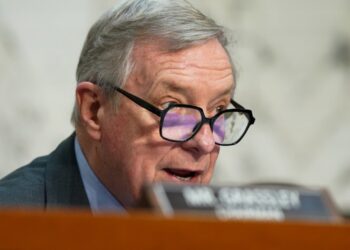
Almost 20 years after the release of “Brokeback Mountain,” director Luke Gilford set out to make a modern queer Western that isn’t a tragedy.
His new film, “National Anthem,” follows a 21-year-old construction worker named Dylan, played by Charlie Plummer, who helps provide for his mother and younger sibling. He takes a job at a queer ranch, called House of Splendor, where he is able to explore his identity, including his sexuality. Here, he meets a love interest named Sky, a transgender woman played by trans actor Eve Lindley.
The movie features vivid, colorful and bold characterizations of a queer rodeo community in New Mexico that implore viewers to consider the mythology of America.
Gilford grew up in Colorado, where his father was a member of the Professional Rodeo Cowboys Association. He said the awareness of the “primarily patriarchal, Christian, and white domain” in mainstream rodeo affected him as he grew older, but he never lost his sense of wonder for the scene.
In 2016, he discovered the International Gay Rodeo Association (IGRA), which hosts educational programs, events and rodeo competitions.
“After my first few trips to IGRA rodeos, I felt not just a sense of acceptance, but the electric charge of belonging,” Gilford said in his artist statement.
When he first attended a queer rodeo and witnessed the waving of American flags and the proud singing of the national anthem, it was like a “jump scare” for him, he said in an interview on Monday.
“It really struck me at first, because that symbol has become so fraught, but then it sunk in just how subversive and beautiful it is for the people who are most often excluded from that narrative to be taking the symbol back,” he said.
Gilford said it was “liberating” to peel away cliches and break archetypes that movies like “Brokeback Mountain” instilled, inviting viewers to push against the expectation for tragedy in queer cinema.
“I think that there’s so much beauty, love and celebration within our community that deserves to be onscreen, especially in a time where it’s so scary to be a queer person in the world,” Gilford said.
After his introduction to the IGRA scene, Gilford began taking portraits of queer rodeo riders and interviewing them about their experiences and rural queerness.
“Like a mirror, I found myself reflected back in so many of these stories, which often center around a profound connection to nature, to community, to the experiences of heartbreak, loss, family and love,” Gilford said in his statement.
The queer rodeo community’s subversion and reclamation of patriotism, as Gilford describes it, is where his script for “National Anthem” began.
Western influence in pop culture has been strong in 2024 so far, with the release of Beyoncé’s country album “Cowboy Carter” earlier this year and the ensuing rise to popularity of country artists such as Shaboozey and Tanner Adell.
Levi Strauss sales have skyrocketed due to increased demand for denim clothing and Western-style shirts, and Black-owned businesses producing goods such as cowboy boots and hats have also experienced a spike in sales this year.
Gilford said he believes part of this is people’s desire to reclaim symbols and chase the “essence of a dream” that includes freedom, liberation and joy.
For himself, he is interested in reinventing the image of cowboys to show that they can be tough as well as tender, and personify someone who is “not afraid to get on a bull as well as to try drag.”
Gilford described rodeo as a Western form of drag performance, saying that there is commonality in aesthetic and culture between mainstream and queer rodeo circuits.
“For as homophobic as that world can be, it’s a pretty queer thing they’re doing,” he joked.
Real queer rodeo community members were included in the film to showcase an “authentic visibility.”
“It was important to put them onscreen and to celebrate them,” Gilford said. “It isn’t just some fantasy or actors pretending.”
Gilford said he also desired to develop characters that “move beyond” unnecessary explanation of identity.
During his time living in New York and Los Angeles, Gilford said, he realized identity politics play a larger role in metropolitan areas than in many southwest rodeo communities.
“At the rodeos, I would never hear about identity in that way. People were just out there living their lives, and they’re not stopping to apologize or explain their identities,” he said.
Although “National Anthem” is Gilford’s feature film directorial debut, his portfolio of queer work is expansive.
The film is based on his book, also titled “National Anthem,” that showcases his photography of the queer rodeo community.
“As children we recite the national anthem with an aura of promise. But as we grow older, many of us discover that it is actually a myth,” he said in the 2020 announcement of his photography book. “The queer rodeo brings that promise back to America — a place where we can be whatever we want to be.”
Gilford said he translated his photographic work of telling stories to filmmaking by leaving spaces for “the language of the face.”
Throughout his career, he has photographed many queer and trans icons including Kristen Stewart and Katy O’Brian for “Love Lies Bleeding,” as well as Indya Moore, Lil Nas X, Hunter Schafer and others for various campaigns and magazines.
Gilford said that Dylan’s story in “National Anthem” is based on his own, and to finally share the film with audiences and receive genuine responses from viewers has been a dream come true.
“National Anthem” opened in Los Angeles, New York and San Francisco on Friday and will be released widely on July 19.
For more from NBC Out, sign up for our weekly newsletter.







